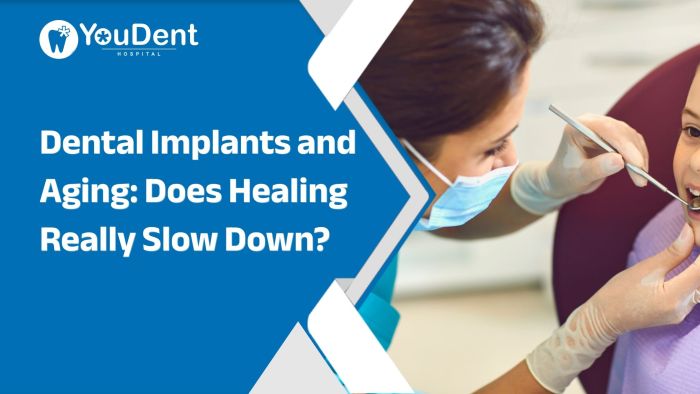
Dental Implants and Aging: Does Healing Really Slow Down?

You know what’s interesting? People often assume implants are only for younger folks. But truth be told, it’s usually seniors who end up needing them most. Teeth wear out, dentures get loose, and suddenly even enjoying a crunchy apple feels like a risky move. Best dental implant in jaipurtry once also.
And then comes the big question: “At my age, will I heal properly?”Honestly? Age alone isn’t the real problem. What matters is your health, your habits, and how carefully you follow recovery steps. Let me walk you through it.
Dental Implants—Think of Them This WayImagine placing a tiny post in the soil and letting the earth hug it tightly until it’s rock solid. That’s exactly how a dental implant works. The post (made of titanium) goes into your jaw, the bone slowly fuses with it, and later a crown is attached. Boom—you’ve got a stable, natural-looking tooth.
The best part? Unlike dentures, there’s no slipping mid-conversation or annoying adhesives. They feel like your own teeth.
Too Old for Implants? Not Really.Here’s the catch: age doesn’t decide success. I’ve seen 75-year-olds recover beautifully, while younger patients with poor health struggled.
Think of it this way—your lifestyle and medical condition matter way more than the candles on your cake. So if you’re reasonably healthy, you’re not “too old.” Period.
Healing—Patience Is the Secret IngredientAfter surgery, your jaw starts bonding with the implant in a process called osseointegration. It’s not overnight—think of it like setting concrete.
Some people are ready in 3 months.
Others need closer to 6.
Seniors may lean toward the longer side, but still heal just fine.
It’s not about rushing—it’s about steady progress.
Why Healing Might Take Longer With AgeLet’s be real, age does bring a few challenges:
Bone loss→ weaker jaws sometimes need grafting first.
Health issues→ diabetes or heart disease can slow things.
Medications→ blood thinners, steroids—they influence recovery.
Immune system→ a little slower to fight off infection.
But none of these are instant “no’s.” They just mean your dentist will plan things carefully.
So, Why Bother at All?Because implants don’t just replace teeth—they give back freedom. You can chew comfortably, speak clearly, and smile without holding back.
And here’s something many forget: chewing well means better digestion and nutrition. That directly affects overall health. So it’s not vanity—it’s wellbeing.
Yes, There Are ChallengesNo sugar-coating here. Healing can be slower. More check-ups may be needed. You’ll need discipline with aftercare.
But ask yourself—would you trade a few months of patience for years of comfort? Most seniors say yes without hesitation.
How to Help Your Body HealBefore surgery:get a health check, review meds, keep blood sugar and pressure under control.
After surgery:soft foods, gentle cleaning, no smoking or alcohol.
During recovery:don’t skip dental visits—they catch small issues early.
It’s like tending a small plant. Care for it daily, and it rewards you.
Do Seniors Actually Succeed With Implants?Yes—and here’s proof. Studies show seniors have over 90% success rateswith implants. That’s nearly identical to younger adults. The secret? Good planning, careful recovery, and choosing the right specialist.
Wrapping It All UpSo, is a dental implant in old ageworth it? Absolutely. Healing may take longer, but the payoff is huge—a confident smile, solid bite, and better health overall. Also read - best dentist in jaipur
Age doesn’t close the door on implants. If anything, it just asks you to be a little more patient and a little more careful. And really, isn’t a stronger smile worth that?
Quick FAQsDoes it hurt more for seniors?
No. The surgery is painless, and recovery discomfort is manageable.
How long does healing take?
Usually 4–6 months, depending on health and bone strength.
Can someone with diabetes get implants?
Yes, if it’s controlled.
Will implants last for life?
With good care, they can last decades—even a lifetime.
Is it worth it after 70?
Definitely. Comfort and confidence are timeless.

